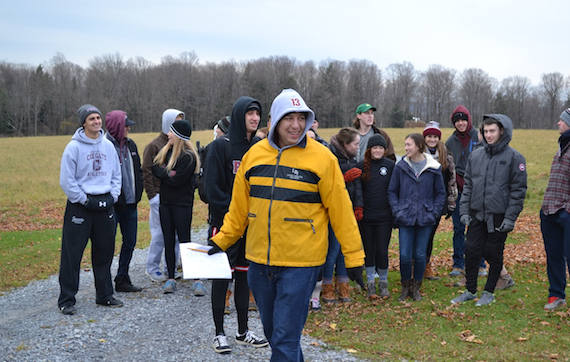Films screen on Mondays at 7 p.m.
The Big Lebowski
22 February, Ho Tung Visualization Lab, Ho Science Center
Dir. Joel Coen, 1998, 117 min.
“The Coen Brothers and their agreeable cast make more fun than sense with this scattered farce about a pothead bowler who is mistaken for a deadbeat philanthropist and drawn into a cluster of kidnappers, nihilists, porn mobsters and Busby Berkeley beauties.” Thus did the original promo for The Big Lebowski surreptitiously convey the film’s subversive message of hope and peace. Looking back on its debut, it is hard to believe that people who first viewed Lebowski’s grotesque reflections on the rational irrationality of international capital and the military industrial complex actually…laughed. Anguish can be hard to distinguish from irony. More than ten years on, however, we think the time is ripe to reconsider the pacifist philosophy of dudeness. Don’t let us down, man.
The First World War
1 March, Golden Auditorium, Little Hall
Dirs. Marcus Kiggell, Simon Rockell and Corina Sturmer, 2003, approx. 120 min.
Based on the work of Oxford historian Hew Strachan, this landmark series places the First World War in a global military context through archival footage, diary entries, letters of soldiers, and studies of battles and participants. It explores many of the lesser-known campaigns, battles, and actions as well as the major conflicts on the Western Front. Selections from the series will be screened with an emphasis on the political conditions leading up to, and resulting from, the war.
Joyeux Noël
22 March, Golden Auditorium, Little Hall
Dir. Christian Carion, 2005, 116 min.
In 1914, World War I, then the bloodiest war in human history, was well under way. However on Christmas Eve, numerous sections of the Western Front called an informal, and unauthorized, truce where the various front-line soldiers of the conflict peacefully met each other in No Man’s Land to share a precious pause in the carnage with a fleeting brotherhood. This film dramatizes one such section as the French, Scottish and German sides partake in the unique event, even though they are aware that their superiors will not tolerate it. Academy Award, Golden Globe, and BAFTA Best Foreign Film Award Nominee, and nominated for 6 César Awards.
Why We Fight
5 April, Golden Auditorium, Little Hall
Dir. Eugene Jarecki, 2005, 98 min.
Inspired by Dwight Eisenhower’s legendary farewell speech (in which he coined the phrase ‘military industrial complex’), Jarecki surveys the scorched landscape of a half-century’s military adventures, asking how – and telling why – a nation of, by, and for the people has become the savings-and-loan of a system whose survival depends on a state of constant war. Why does America fight? What are the forces – political, economic, ideological – that drive us to do combat with an ever-changing enemy? Winner, 2005 Sundance Film Festival Grand Jury Prize, 2007 Peabody Award; Nominated, 2007 Documentary Screenplay Award.
The Day the Earth Stood Still
12 April, Golden Auditorium, Little Hall
Dir. Robert Wise, 1951, 92 min.
A visitor from outer space, Klaatu, comes to earth with a warning. Having developed rocket and nuclear technologies, earth is a potential threat to the galaxy’s other civilizations. Unless war is abolished, the Earth will be destroyed in a preemptive peacekeeping operation. Can Klaatu deliver his message, and will it be heard? A period classic, and winner of a 1952 Golden Globe Award. To be screened with 3 Cold War-era shorts from the Prelinger film archives: “Duck and Cover” (1951, 9 mins.), “The House in the Middle” (1954, 12 mins.), and “Our Cities Must Fight” (1951, 9 mins.).
Pray the Devil Back to Hell
19 April, Golden Auditorium, Little Hall
Dir. Gini Reticker, 2008, 72 min.
A celebrated documentary that tells the dramatic success story of the women’s peace movement of Liberia, where Christian and Muslim women banded together to end their country’s civil war. Leymah Gbowee, the central figure in the film, and the Women of Liberia are the recipients of the 2009 John F. Kennedy Profile in Courage Award. Best documentary, Tribeca Film Festival, and awards at Silverdocs, Jackson Hole, Traverse City, Heartland, One World International Human Rights (Prague), and Movies That Matter (Netherlands) Film Festivals.
Shadow Company
26 April, 114 Little Hall
Dir. Nick Bicanic and Jason Bourque, 2006, 86 min.
In the late 20th Century the distinction between soldier and mercenary became blurred. The recent use of private military companies (PMCs) in Iraq has been more extensive than at any time in modern history. The brutal killing of four PMC employees in Fallujah in April 2004 made it clear that these “contractors” are not merely workers in a foreign land. But are the lives of such men the only thing at risk when we privatize warfare? Shadow Company explores the moral and ethical issues private military solutions create for PMC employees, for the Western governments who foot the bill for their salaries, and for everyday citizens. The filmmakers traveled the globe to expose all sides of the issue, interviewing PMC staff, owners and lobbyists, former mercenaries, academics, journalists and top authors. Winner of four 2007 Leo Awards: Best Documentary, Directing, Writing and Editing.
Films screen on Mondays at 7 p.m.



